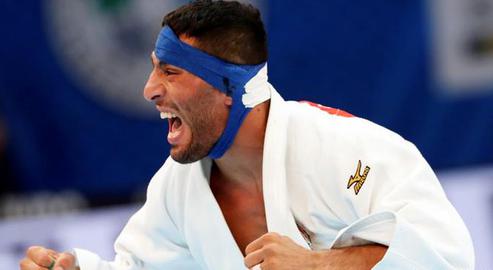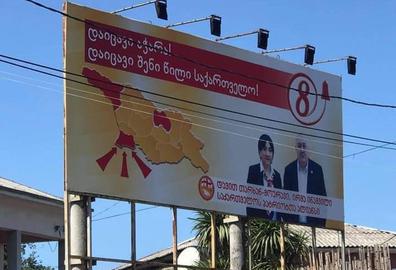On Wednesday, September 16, the Switzerland- based Court of Arbitration for Sport (CAS) met both in person and online to review Iran’s complaint against the International Judo Federation (IJF). The Federation had suspended Iran after the Iranian world champion judoka Saeid Mollaei deliberately lost in the semi-final at the Tokyo 2019 World Championships that August, so as to avoid a potential match with an Israeli athlete, Sagi Mugi.
After Mollaei revealed that he had lost the match deliberately, he did not return to Iran for fear of retaliation. Instead he was given a two-year visa by Germany and in December 2019, was granted citizenship by Mongolia and is now a member of Mongolia’s national judo team.
News that Mollaei was stepping down to avoid competing with an Israeli had first been reported on August 30 by the Japanese newspaper Asahi Shimbun. IJF President Marius Vizer told the paper that Mollaei had purposely and “under pressure” lost to Matthias Casse of Belgium in the semi-finals.
The IFJ was quick to react, announcing on its website in September 18, 2019: "Following what happened during the last World Judo Championships in Tokyo in 2019, the International Judo Federation pronounces against the Iran Judo Federation a protective suspension from all competitions, administrative and social activities organized or authorized by International Judo Federation and its Unions.”
Iran’s Judo Federation filed a complaint with the CAS two weeks later, hoping this tribunal would overturn the suspension – which seems unlikely. The country’s National Olympic Committee and Judo Federation have already spent more than one million dollars in pursuing the case, and according to CAS rules, the plaintiff must pay for all trial expenses of holding the trial, including payments to judges and travel expenses, as well as costs to the other party in the dispute.
Iran’s five-member delegation to CAS includes Arash Mir Esmaili, the president of the Iranian Judo Federation, Majid Zareian, the head coach of Iran’s National Judo Team, Nasrollah Sajjadi, a former acting Minister of Sports and the administrator of Iran’s athletes at Tokyo Olympics, Mohammad Reza Davarzani, president of the Iranian Volleyball Federation, and Amirsaed Vakil, a sports lawyer. On the opposing side, the International Judo Federation has sent a 15-member delegation to court which includes three prominent international sports lawyers.
Despite Threats, The Key Protagonist Testifies against Iran
Before the hearing the IJF had confirmed that Saeid Mollaei himself, as well as his former coach Mohammad Mansouri and Vahid Sarlak, another former member of Iran’s Judo National Team and an international champion in his own right, would all be testifying.
On learning that Mollaei would appear in court as a witness, Arash Mir Esmaili called him a “traitor” and a few hours before the court proceedings started on September 16, the sports news website Inside the Game reported that Mollaei had been receiving threats against himself and his family ahead of the hearing. “Fears for Mollaei’s family in Iran have increased following the execution last Saturday (September 12) of wrestling champion Navid Afkari,” the report added.
Mollaei arrived at the CAS building under the protection of a special unit of Swiss police and was later returned to his hotel accompanied by the same entourage. The session on September 6, during which all three Iranian sportsmen testified against the Islamic Republic, lasted for six hours.
Mollaei was not the only Iranian witness forced to deal with attempts at interference before the CAS hearing. Hours before he was due to speak, his fellow athlete Vahid Sarlak told Deutsche Welle: “In recent weeks the Iranian regime has stepped up the pressure on me not to testify at the appeal hearing, not to tell the truth about what happened – saying that if I did so I would be a traitor to my country."
But Sarlak, who is now a naturalized German citizen, said that not only would he not be intimidated,but he was also convinced Iran had no chance of winning the case. "The evidence is so clear that I see no chance at all that the Court of Arbitration for Sport will overturn the Iranian Judo Federation's suspension," Sarlak said. "This will end in a fiasco for the Islamic Republic and for the Iranian taxpayer.”
In the aftermath of the hearing the Iranian state-controlled news agency Tasnim claimed that CAS judges, after hearing both sides, might invite new witnesses to testify.
A Foiled Mutiny Within the Iranian Delegation
The Islamic Republic is reportedly planning to claim that over the past 40 years, no Iranian athlete has ever been ordered to avoid competing against Israeli athletes. But tension between the country’s representatives is already beginning to simmer.
On June 2 this year, while Iran was engaged in negotiations with CAS and the International Judo Federation, Nasrollah Sajjadi, the most senior and best-known member of Iran’s delegation to the court, said he had had decided not to travel to Switzerland because of the “unprofessional” behavior of Arash Mir Esmaili. But then, under pressure from the Sports Ministry, he reneged on the decision and traveled to Switzerland as planned.
Nasrollah Sajjadi is one of the last sports managers in Iran to have received his education before the 1979 Islamic Revolution. He has a PhD in sports management, has written 12 books and has authored or coauthored more than 100 research studies on sports management published in scholarly journals both in Iran and abroad. He has been in charge of Iranian sports teams participating in international events, such as the Olympics and the Asian Games, five times.
Since the autumn of 2019 Sajjadi has been aware of the possibility that the International Olympic Committee (IOC) might move towards suspending all Iranian sports because of political interference in sporting affairs. He played a pivotal role in the signing of an agreement in January 2020, in which Reza Salehi Amiri, head of Iran’s National Olympic Committee, and Sports Minister Masoud Soltanifar pledged to the International Olympic Committee that Iran would lift its ban on competing with Israeli athletes.
This agreement was supposed to remain confidential but the next day, Thomas Bach, head of the International Olympic Committee, publicly announced that the IOC would not be suspending Iran, because Iran's National Olympic Committee had given assurances that it would end its "discriminatory" policy against Israeli athletes. According to the IOC president, Iran’s National Olympic Committee had promised in writing to "fully comply with the Olympic Charter" in the future.
There are some parallels between the case of Mollaei and that of Arash Mir Esmaili, the current president of the Iranian Judo Federation, who was once a judoka himself. In the 2004 Athens Summer Olympics, Mir Esmaili had been the favorite to win the gold medal but intentionally disqualified himself and said that "although I had trained for months and was in good shape, I refused to fight my Israeli opponent in sympathy with the suffering of the people of Palestine, and I do not regret it at all.” A day later, the games organizing committee expelled Mir Esmaili from Greece.
In addition, when Mir Esmaili was the vice president of Iran’s Judo Federation, the Asian Judo Confederation suspended the Iranian federation, accusing him of trying to bribe Uzbek judokas to intentionally lose to Iranian athletes so that Iranian judokas could get into the Olympic games.
If Iran loses its case at the CAS, it will mean that an international institution — equal in rank to the IOC, but higher than any single international sports federation — has found the Islamic Republic of Iran guilty of allowing politics to interfere with sports. In that case, not only one federation but the entirety of Iranian sports would be in fresh danger of suspension by IOC.
Related Coverage:
Iranian Sports Minister is Given a Choice: Compete against Israel or Face Ban, 18 January 2020
Iranian Judo Federation Suspended — And Now all Iranian Sports are at Risk, 18 September 2019
Iranian Wrestlers May be Ordered to Lose Again to Avoid Facing Israelis, 9 September 2019
Iranian Judo Champion Forced to Avoid an Israeli Competitor Leaves, Settles in Germany, 2 September 2019
Iran's Female Boxer Makes History in France, 15 April 2019
The Iranian Fugitive Boxer Who Said No to the “Israel Ban”, 25 February 2019
Chess Grandmaster's Brother Also Abandons Iran, 6 October 2017
Iranian Female Chess Grandmaster Abandons Iran for America, 3 October 2017
visit the accountability section
In this section of Iran Wire, you can contact the officials and launch your campaign for various problems


























comments